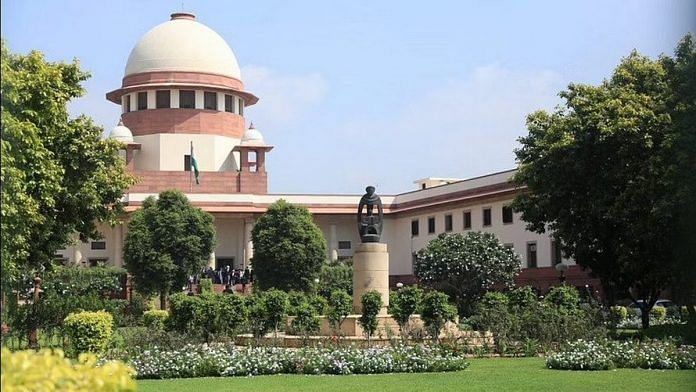New Delhi: The Centre Thursday told the Supreme Court that it was ready to conduct elections in the Union territory (UT) of Jammu and Kashmir, but could not give any timeline on the restoration of statehood to the region. It reiterated, however, that the erstwhile state’s UT status was temporary.
This statement was made by solicitor general (SG) Tushar Mehta before a Constitution bench headed by Chief Justice D.Y. Chandrachud, which on Tuesday had asked the Centre to outline a timeframe on restoration of statehood to Jammu and Kashmir.
The erstwhile state was divided into the two UTs of Jammu and Kashmir and Ladakh following the abrogation of Article 370 that bestowed a special status to J&K. The apex court is hearing a batch of petitions challenging the abrogation, as well as the J&K Reorganiaation Act that led to the bifurcation.
The SC had observed Tuesday that restoration of democracy was important, while asking the Centre to let the court know on the aspect of statehood.
In response, Mehta said Thursday that initiatives were being taken to restore stability in the region and the issue of restoration of statehood would be decided based on the degree of normalcy achieved. He also provided data to the bench in support of his assertion that the situation in J&K was inching towards normalcy, since incidents of incursions and stone pelting have drastically reduced following the abrogation of Article 370.
“[The] Central government is ready for elections any time now. Till date the updating of voters list was going on, which is substantially over. Some part is remaining that the Election Commission is doing,” Mehta told the bench.
Regarding the conduct of elections, he said the state election commission along with the central poll body would take a call on it.
The SG said three-tier elections are to be held in J&K — panchayat, municipality and legislative. In Ladakh, while the Hill Development Council elections in Leh are over, polls are due in Kargil this month. The two areas are part of the Ladakh region, which shall remain a permanent UT without an assembly, according to Mehta.
With regard to the J&K region, as of now, it will be a UT with an assembly where Centre will have a direct control over two subjects, law and order and police, he added.
Also read: Terrorists’ brazen new strategy in J&K: Ambushing security forces with body cameras on
Restoration of stability in J&K
Mehta said compared to the pre-2019 situation terrorist-induced incidents have reduced by 42.5 percent in J&K, infiltration has come down by 90.20 per cent and law and order, including stone pelting events, with 92 percent fewer cases being reported than in the past. Hence, casualties among security personnel have reduced by more than 69 percent.
“What affected the elections most were stone-pelting incidents and regular calls for bandhs/hartal. In 2018, the stone pelting was 1761, now it is nil. Not just because of security and police steps, but by other steps such as gainfully employing youth who used to be killed by secessionist forces. Organised bands by secessionist groups in 2018 was 52, but now it’s nil,” he said.
As a result the region has seen a huge influx of tourist inflow — in 2022 it was 1.8 crore, while in 2023 so far 1 crore tourists have already visited, the solicitor general informed the bench.
All these facts, the SG added, indicate to the progress made so far in bringing stability to the region. Governance by the Centre as a UT was essential to make these initiatives, he added. Full statehood would be restored once there is complete stability in J&K, he said.
Senior advocate Kapil Sibal, appearing for one of the petitioners, disputed the statistics shared by Mehta, arguing they do not represent the true scenario of J&K. “If you have 5000 people under house arrest and section 144 [of Code of Criminal Procedure, CrPc, which authorises the executive magistrate of any state or territory to issue an order to prohibit the assembly of four or more people in an area] throughout the state, there can be no bandh [sic],” he said, urging the court to not take note of the data.
To this Mehta responded, in a “lighter vein,” : “that means the right people are under house arrest”.
CJI Chandrachud, however, told Sibal that the court has already clarified that facts such as those presented by Mehta would not have bearing on the Constitutional challenges made in the petitions.
“To be fair to SG, what he was saying is that the road map to full statehood would take time, but right now development work is taking place, some stability has to come, this is not permanent. We place these facts in the perspective of the road map to statehood,” the CJI said.



